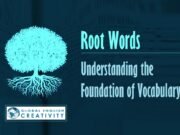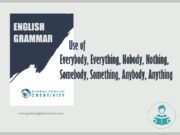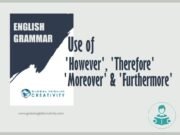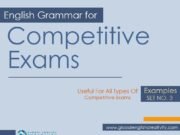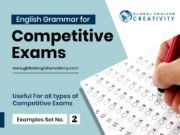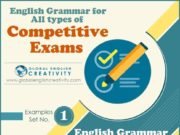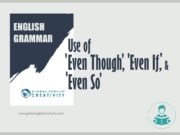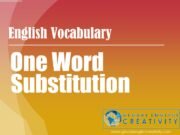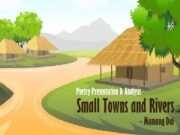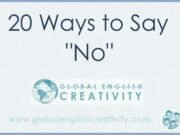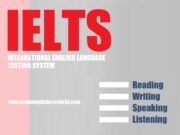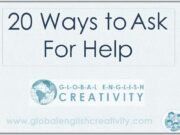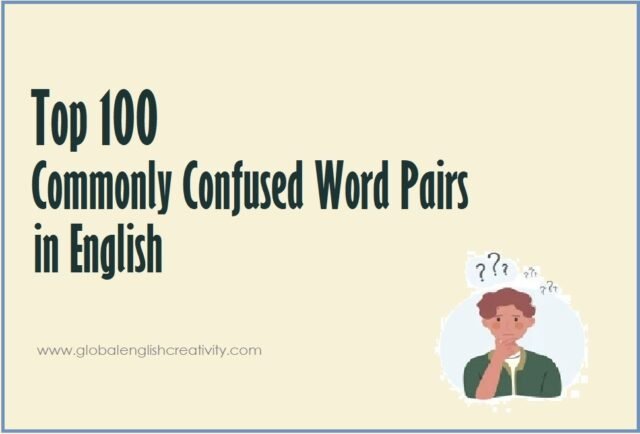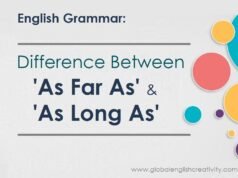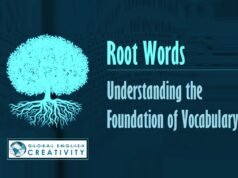Commonly Confused Words are pairs or groups of words that sound similar or have similar spellings, leading to confusion in their usage. These words may have different meanings, grammatical functions, or contexts in which they are appropriately used. Confusion often arises because of their similar pronunciation or spelling. Understanding the distinctions between these words is important for effective communication in writing and speaking.
Here’s an expanded list of 100 commonly confused word pairs with explanations:
- Accept vs. Except
- Accept: to receive willingly.
- Except: to exclude or leave out.
- Affect vs. Effect
- Affect: to influence or produce a change in something.
- Effect: the result or outcome of an action.
- Advice vs. Advise
- Advice: guidance or recommendations offered to someone.
- Advise: to give advice or counsel.
- Allude vs. Elude
- Allude: to indirectly refer to something.
- Elude: to escape or avoid, typically in a clever way.
- Assure vs. Ensure vs. Insure
- Assure: to make someone feel confident or sure.
- Ensure: to make certain that something happens.
- Insure: to provide insurance coverage.
- Complement vs. Compliment
- Complement: something that completes or goes well with something else.
- Compliment: a polite expression of praise or admiration.
- Elicit vs. Illicit
- Elicit: to draw out a response or reaction.
- Illicit: illegal or forbidden.
- Farther vs. Further
- Farther: refers to physical distance.
- Further: refers to metaphorical or figurative distance or advancement.
- Its vs. It’s
- Its: possessive form of “it.”
- It’s: contraction for “it is” or “it has.”
- Lay vs. Lie
- Lay: to put or place something down.
- Lie: to recline or rest in a horizontal position.
- Lead vs. Led
- Lead: to guide or direct.
- Led: past tense of “lead.”
- Loose vs. Lose
- Loose: not tight or firmly fixed in place.
- Lose: to be unable to find, to suffer loss or defeat.
- Passed vs. Past
- Passed: past tense of “pass.”
- Past: refers to a time that has gone by.
- Peak vs. Peek vs. Pique
- Peak: the highest point or summit.
- Peek: to look quickly or secretly.
- Pique: to stimulate interest or provoke.
- Principal vs. Principle
- Principal: main or most important.
- Principle: a fundamental truth or belief.
- Than vs. Then
- Than: used for making comparisons.
- Then: used to indicate time or consequence.
- Their vs. There vs. They’re
- Their: possessive form of “they.”
- There: refers to a place.
- They’re: contraction for “they are.”
- To vs. Too vs. Two
- To: used as a preposition or to indicate an infinitive.
- Too: means also or excessively.
- Two: the number 2.
- Weather vs. Whether
- Weather: the state of the atmosphere.
- Whether: introduces a choice between alternatives.
- Who’s vs. Whose
- Who’s: contraction for “who is” or “who has.”
- Whose: possessive form of “who.”
- You’re vs. Your
- You’re: contraction for “you are.”
- Your: possessive form of “you.”
- Altogether vs. All together
- Altogether: entirely or completely.
- All together: in a group or collected manner.
- Breath vs. Breathe
- Breath: noun referring to the air taken into or expelled from the lungs.
- Breathe: verb meaning to take in or expel air from the lungs.
- Cite vs. Site vs. Sight
- Cite: to quote or refer to as an authority.
- Site: a location or place.
- Sight: the ability to see or a view.
- Counsel vs. Council
- Counsel: advice or guidance.
- Council: a group of people convened for consultation or decision-making.
- Dual vs. Duel
- Dual: consisting of two parts.
- Duel: a prearranged combat between two individuals.
- Explicit vs. Implicit
- Explicit: stated clearly and in detail.
- Implicit: implied but not plainly expressed.
- Faze vs. Phase
- Faze: to disturb or disconcert.
- Phase: a distinct period or stage in a process.
- Historic vs. Historical
- Historic: something significant in history.
- Historical: relating to history or past events.
- Lessen vs. Lesson
- Lessen: to make less or reduce.
- Lesson: a period of learning or instruction.
- Precede vs. Proceed
- Precede: to come before in time or order.
- Proceed: to move forward or continue with an action.
- Pray vs. Prey
- Pray: to address a deity with adoration, confession, supplication, or thanksgiving.
- Prey: an animal hunted or killed for food.
- Profit vs. Prophet
- Profit: financial gain or benefit.
- Prophet: a person regarded as an inspired teacher or proclaimer of the will of a deity.
- Stationary vs. Stationery
- Stationary: not moving or still.
- Stationery: writing materials.
- Tortuous vs. Torturous
- Tortuous: full of twists and turns.
- Torturous: involving or causing torture or severe pain.
- Waive vs. Wave
- Waive: to refrain from insisting on or using a right or claim.
- Wave: a long body of water curling into an arched form and breaking on the shore.
- Acceptable vs. Exceptable
- Acceptable: satisfactory or allowable.
- Exceptable: not a commonly used term, the correct term is “unacceptable.”
- Desert vs. Dessert
- Desert: a dry, barren area of land.
- Dessert: the sweet course eaten at the end of a meal.
- Hear vs. Here
- Hear: to perceive sound with the ear.
- Here: in, at, or to this place or position.
- Passed vs. Past
- Passed: past tense of “pass.”
- Past: refers to a time that has gone by.
- Personal vs. Personnel
- Personal: relating to a particular person; private.
- Personnel: employees or staff.
- Practice vs. Practise
- Practice: (noun) referring to the actual application or use of an idea, belief, or method.
- Practise: (verb) meaning to perform or exercise a skill repeatedly in order to improve or maintain proficiency.
- Role vs. Roll
- Role: a part or character played by an actor.
- Roll: to move by turning over and over on an axis.
- Seen vs. Scene
- Seen: past participle of “see.”
- Scene: a sequence of continuous action in a play, movie, opera, or book.
- Site vs. Sight vs. Cite
- Site: a location or place.
- Sight: the ability to see or a view.
- Cite: to quote or refer to as an authority.
- Complement vs. Compliment
- Complement: something that completes or goes well with something else.
- Compliment: a polite expression of praise or admiration.
- Bored vs. Board
- Bored: feeling weary and impatient because one is unoccupied or lacks interest in one’s current activity.
- Board: a long, thin, flat piece of wood or other hard material used for floors or other building purposes.
- Then vs. Than
- Then: used to indicate time.
- Than: used for making comparisons.
- Climactic vs. Climatic
- Climactic: relating to the highest point of a sequence of events; a climax.
- Climatic: relating to climate.
- Principal vs. Principle
- Principal: main or most important.
- Principle: a fundamental truth or belief.
- Adverse vs. Averse
- Adverse: unfavorable or harmful.
- Averse: having a strong dislike or opposition to something.
- Alter vs. Altar
- Alter: to change or modify.
- Altar: a table or platform used in religious ceremonies.
- Appraise vs. Apprise
- Appraise: to assess the value or quality of something.
- Apprise: to inform or notify someone of something.
- Assent vs. Ascent
- Assent: agreement or approval.
- Ascent: the act of rising or climbing upwards.
- Canvas vs. Canvass
- Canvas: a strong, durable fabric used for making sails, tents, or paintings.
- Canvass: to solicit or seek opinions, votes, or sales.
- Coarse vs. Course
- Coarse: rough or harsh in texture.
- Course: a direction or path taken.
- Conscious vs. Conscience
- Conscious: aware or awake.
- Conscience: the inner sense of what is right or wrong in one’s behavior.
- Council vs. Counsel
- Council: a group of people convened for consultation or decision-making.
- Counsel: advice or guidance.
- Curb vs. Kerb
- Curb: to restrain or control.
- Kerb: the edge of a raised pavement or sidewalk.
- Dependent vs. Dependant
- Dependent: (adjective) relying on something or someone else for support.
- Dependant: (noun) a person who relies on another, typically a family member, for financial support.
- Discreet vs. Discrete
- Discreet: careful or cautious in one’s speech or actions.
- Discrete: individually separate and distinct.
- Eminent vs. Imminent
- Eminent: distinguished or prominent.
- Imminent: about to happen; impending.
- Elicit vs. Solicit
- Elicit: to draw out a response or reaction.
- Solicit: to ask for or seek something from someone.
- Envelop vs. Envelope
- Envelop: to completely surround or cover.
- Envelope: a flat, usually rectangular paper container for a letter.
- Explicit vs. Implicit
- Explicit: stated clearly and in detail.
- Implicit: implied but not plainly expressed.
- Faint vs. Feint
- Faint: lacking in strength or clarity; weak.
- Feint: a deceptive or pretended blow, thrust, or other movement.
- Formally vs. Formerly
- Formally: in a formal manner.
- Formerly: previously; in the past.
- Grizzly vs. Grisly
- Grizzly: a species of bear.
- Grisly: causing horror or disgust.
- Hangar vs. Hanger
- Hangar: a large building for storing aircraft.
- Hanger: a device for hanging clothes.
- Hoard vs. Horde
- Hoard: a stockpile or accumulation of items.
- Horde: a large group of people.
- Hone vs. Home
- Hone: to sharpen or refine something.
- Home: a place of residence or dwelling.
- Imply vs. Infer
- Imply: to suggest or indicate indirectly.
- Infer: to deduce or conclude from evidence and reasoning.
- Lien vs. Lean
- Lien: a legal claim on property as security for a debt.
- Lean: to incline or bend from a vertical position.
- Moral vs. Morale
- Moral: relating to principles of right and wrong behavior.
- Morale: the confidence, enthusiasm, and discipline of a person or group.
- Palate vs. Palette vs. Pallet
- Palate: the roof of the mouth; sense of taste.
- Palette: a thin board on which an artist mixes paints.
- Pallet: a portable platform for storing or moving goods.
- Patience vs. Patients
- Patience: the ability to tolerate waiting, delay, or frustration.
- Patients: plural of “patient,” referring to individuals receiving medical treatment.
- Cavalry vs. Calvary
- Cavalry: a mounted military force.
- Calvary: the place where Christ was crucified.
- Peak vs. Pique vs. Peek
- Peak: the highest point or summit.
- Pique: to stimulate interest or provoke.
- Peek: to look quickly or secretly.
- Persecute vs. Prosecute
- Persecute: to oppress or harass someone, especially because of their race, religion, or beliefs.
- Prosecute: to institute legal proceedings against someone.
- Pole vs. Poll
- Pole: a long, slender, rounded piece of wood or metal.
- Poll: a sampling or collection of opinions on a subject.
- Pour vs. Pore
- Pour: to flow or cause to flow in a steady stream.
- Pore: a minute opening in the skin or a surface.
- Principle vs. Principal
- Principle: a fundamental truth or belief.
- Principal: main or most important.
- Profit vs. Prophet
- Profit: financial gain or benefit.
- Prophet: a person regarded as an inspired teacher or proclaimer of the will of a deity.
- Rain vs. Rein vs. Reign
- Rain: water falling from the sky.
- Rein: a strap or rope used to control a horse.
- Reign: the period of rule of a monarch or ruler.
- Refuge vs. Refuse
- Refuge: a safe place or shelter.
- Refuse: to decline to accept or allow something.
- Role vs. Roll
- Role: a part or character played by an actor.
- Roll: to move by turning over and over on an axis.
- Senser vs. Censer
- Senser: a person or thing that senses.
- Censer: a container in which incense is burned.
- Sweat vs. Sweet
- Sweat: moisture exuded through the pores of the skin, typically in profuse quantities when exerting oneself physically.
- Sweet: having the pleasant taste characteristic of sugar or honey; not salty, sour, or bitter.
- Tenant vs. Tenet
- Tenant: a person who occupies land or property rented from a landlord.
- Tenet: a principle or belief, especially one of the main principles of a religion or philosophy.
- Torturous vs. Tortuous
- Torturous: involving or causing torture or suffering.
- Tortuous: full of twists and turns; excessively lengthy and complex.
- Uninterested vs. Disinterested
- Uninterested: not interested in or concerned about something.
- Disinterested: unbiased; not influenced by personal feelings or interests; impartial.
- Vain vs. Vein
- Vain: having or showing an excessively high opinion of one’s appearance, abilities, or worth.
- Vein: a blood vessel carrying blood towards the heart or a distinctive quality or style.
- Wail vs. Whale
- Wail: to make a prolonged high-pitched cry of pain, grief, or anger.
- Whale: a very large marine mammal with a streamlined hairless body, a horizontal tail fin, and a blowhole on top of the head for breathing.
- Waive vs. Wave
- Waive: to refrain from insisting on or using a right or claim.
- Wave: a long body of water curling into an arched form and breaking on the shore.
- Wary vs. Weary
- Wary: feeling or showing caution about possible dangers or problems.
- Weary: feeling or showing tiredness, especially as a result of excessive exertion or lack of sleep.
- Warrant vs. Warrant
- Warrant: a document issued by a legal or government authority authorizing the police or another body to make an arrest, search premises, or carry out some other action relating to the administration of justice.
- Warrant: justify or necessitate (a certain course of action).
- Whet vs. Wet
- Whet: to sharpen the blade of (a tool or weapon).
- Wet: covered or saturated with water or another liquid.
- Wreck vs. Wreak
- Wreck: the destruction of a ship at sea; the remains of something that has been badly damaged or destroyed.
- Wreak: cause (a large amount of damage or harm).
- Yoke vs. Yolk
- Yoke: a wooden crosspiece that is fastened over the necks of two animals and attached to the plow or cart that they are to pull.
- Yolk: the yellow internal part of a bird’s egg.
- Zeal vs. Seal
• Zeal: great energy or enthusiasm in pursuit of a cause or an objective.
• Seal: a device or substance that is used to join two things together so as to prevent them from coming apart or to prevent anything from passing between them.
also read:
| ONLINE GRAMMAR QUIZZES with CERTIFICATES |
| ENGLISH GRAMMAR_1 |
| ENGLISH GRAMMAR_2 |
| GRAMMAR: SPOT THE ERROR |
| USEFUL EXPRESSIONS IN ENGLISH SPEAKING |
| WORD FORMATION PROCESSES |
| PHONETICS |


